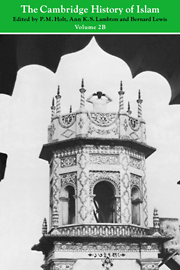Book contents
- Frontmatter
- Introduction
- PART VIII ISLAMIC SOCIETY AND CIVILIZATION
- 1 THE GEOGRAPHICAL SETTING
- 2 THE SOURCES OF ISLAMIC CIVILIZATION
- 3 ECONOMY, SOCIETY, INSTITUTIONS
- 4 LAW AND JUSTICE
- 5 RELIGION AND CULTURE
- 6 MYSTICISM
- 7 REVIVAL AND REFORM IN ISLAM
- 8 LITERATURE
- 9 ART AND ARCHITECTURE
- 10 SCIENCE
- 11 PHILOSOPHY
- 12 WARFARE
- 13 THE TRANSMISSION OF LEARNING AND LITERARY INFLUENCES TO WESTERN EUROPEo
- Dynastic List
- Bibliography
- Glossary
- Index
- References
11 - PHILOSOPHY
from PART VIII - ISLAMIC SOCIETY AND CIVILIZATION
Published online by Cambridge University Press: 28 March 2008
- Frontmatter
- Introduction
- PART VIII ISLAMIC SOCIETY AND CIVILIZATION
- 1 THE GEOGRAPHICAL SETTING
- 2 THE SOURCES OF ISLAMIC CIVILIZATION
- 3 ECONOMY, SOCIETY, INSTITUTIONS
- 4 LAW AND JUSTICE
- 5 RELIGION AND CULTURE
- 6 MYSTICISM
- 7 REVIVAL AND REFORM IN ISLAM
- 8 LITERATURE
- 9 ART AND ARCHITECTURE
- 10 SCIENCE
- 11 PHILOSOPHY
- 12 WARFARE
- 13 THE TRANSMISSION OF LEARNING AND LITERARY INFLUENCES TO WESTERN EUROPEo
- Dynastic List
- Bibliography
- Glossary
- Index
- References
Summary
Islamic philosophic thought presents a rather greater diversity than medieval Christian philosophy, and the range of the differences of opinion is perhaps wider. For the purposes of the present survey, a division into two main classes may conveniently be adopted. One of these classes comprises the falāsifa (this Arabic word for philosophers being used as a technical term) and philosophical theologians whose scheme of reference is provided—whether they acknowledge this fact or not—by the Aristotelian, the Platonic or the neo-Platonic systems of thought. The second main class will comprise the mutakallimūn and various other thinkers whose opinions are related to theirs or derived from them. Some of these thinkers profess to be hostile to kalām. In contradistinction to the philosophers and the philosophical theologians, the mutakallimūn and the other thinkers belonging to this class do not as a rule use the concepts of the Aristotelian, Platonic or neo-Platonic systems as their scheme of reference, though in many cases an influence of these dominant currents of antique philosophy as well as other Greek schools of thought may be discerned. The sociologist and historian Ibn Khaldūn does not belong to either of these two classes. The Ismā‘īlī theologians constitute a border case.
- Type
- Chapter
- Information
- The Cambridge History of Islam , pp. 780 - 823Publisher: Cambridge University PressPrint publication year: 1977

